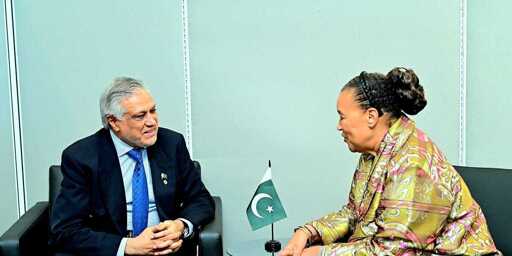We have a commitment to ensuring that our journalism is not locked behind a paywall. But the only way we can sustain this is through your voluntary support. Please subscribe or make a 501©(3) tax-deductible donation to keep Drop Site running.
 Pakistan Foreign Minister Ishaq Dar meets with former Secretary General of the Commonwealth Patricia Scotland during the UN General Assembly in New York on September 26, 2025. Photo: Pakistan Foreign Ministry.
Pakistan Foreign Minister Ishaq Dar meets with former Secretary General of the Commonwealth Patricia Scotland during the UN General Assembly in New York on September 26, 2025. Photo: Pakistan Foreign Ministry.
When Shirley Ayorkor Botchwey settled into her new role as secretary general of the Commonwealth Observer Group, she discovered she’d been handed a rather difficult diplomatic dilemma. She was now leading an election integrity organization that was directly complicit in covering up rampant election fraud.
Her predecessor, Patricia Scotland, had overseen the observation of the February 8, 2024 elections in Pakistan, which saw widespread and undeniable irregularities that clearly swayed the election away from the party of Imran Khan. Scotland left office in March 2025, and had been under intense pressure from member states, the Pakistani media, and those involved with COG’s report on the election to release it before vacating her chair, sources familiar with the situation said. Scotland had even been alerted by one of the authors of the report that if she tried to suppress it, it was bound to leak eventually, a source familiar with the warning said.
Indeed, Scotland was expected to release the report as one of her final acts. But after a meeting with a top Pakistani official, who is said to have warned her that the release of the report could lead to instability in the country, Scotland, who enjoyed close personal ties to Pakistani Prime Minister Shahbaz Sharif, decided to leave the problem in the inbox of her successor.
In July, Botchwey sat down for a meeting with Pakistani officials in London, who continued to press against releasing the report. As a compromise, she suggested that the military-backed regime should conduct an impartial inquiry into its own rigging of the election, and implement new best practices in response to the findings of the report, which Scotland had forwarded to Pakistan’s election commission.
Botchwey requested a report back on progress toward election reform, which Scotland had also suggested Pakistan undertake. Pakistan had been ignoring such requests for months—and there is no evidence they ever conducted their own internal review. She pressed again on the question, underlining the need for some cooperation from Pakistan and the pressure she faced. The officials assured Botchwey some response would be coming.
On August 19, Foreign Minister Muhammad Ishaq Dar met with Botchwey at Marlborough House in London. He presented Botchwey with what she’d been looking for—a letter from Pakistan spelling out what improvements the country had been making when it came to election integrity. IShe told Ishaq Dar she did not intend to release the COG report and understood the negative implications for the Pakistani government if she did. Having inherited the problem from Scotland, Botchwey was now taking full ownership of it.
Inside the COG, the effort was seen as more whitewashing of the election fraud, as it only furthered the suppression of the COG report. Commonwealth, whose members include many of the various countries that made up the British empire, was dedicated to improving democratic practices. Now it was being wielded to protect a government that had clearly come to power by stealing an election.
Not long after, Drop Site News reached out to Commonwealth for comment, telling the organization that we had obtained a leaked copy of the report from a whistleblower. (That story is here.)
While a Commonwealth spokesperson asked for time to prepare a response, Botchwey kicked into high gear. She told Pakistani officials that despite her recent promise, she now had no choice but to release the report. She eventually agreed to put its publication on hold until after Dar’s Commonwealth meetings on the sidelines of the United Nations General Assembly in New York.
Commonwealth then sent Drop Site a truly bizarre statement, saying that their report, which had been completed and approved since early 2024, was planned for release at the end of September 2025. The statement did not explain why it had continued to withhold the report for a year and a half, even in the face of repeated inquiries by Pakistani news outlets, or why it needed to wait just a few weeks longer despite the inordinately long delay. The report is expected to be released next week.
In response to follow-up queries, the Commonwealth told Drop Site that, “As we have communicated before, the Commonwealth Observer Group’s final report on the 2024 Pakistan general elections will be released later this month. In line with our established guidelines, agreed by our Heads of Governments in 2018, the final reports of all our Observer Groups are made publicly available. We reiterate that our work, including the work of the independent Commonwealth Observer Groups, is carried out free from any interference.”
Discord Within Commonwealth
Drop Site News published the Election Observer Group report in full on September 13 after it was leaked by a source frustrated by the Commonwealth’s decision to withhold it. The report contains damning findings about the conduct of the 2024 vote—including violence and detention targeting opposition candidates, calculated internet disruptions, and manipulation of vote tallies. According to the report, the abuses mostly targeted supporters of imprisoned Pakistani Prime Minister Imran Khan and his political party, the Pakistan Tehreek-e-Insaaf (PTI).
The delay was unprecedented in the history of the Commonwealth Secretariat; in more than four decades since it began conducting observer missions, the Commonwealth had never declined to release one of its reports. The source hoped that making the report public would prompt the Commonwealth Secretariat—which is responsible for upholding democratic processes—to evaluate its role in assisting the Pakistani government in suppressing evidence of fraud in the election.
The publication of the leaked report by a news outlet has sowed discord within the Commonwealth. Commonwealth staff repeatedly relayed concerns to Scotland over her suppression of the report, and members of the team that monitored the election also emailed Scotland, arguing she had a “moral duty” to the people of Pakistan, who had come out to the polls in droves, a source with knowledge of the pressure on Scotland said. But despite outcry following the leak from Pakistani civil society and some media outlets, sources say that the organization has not announced any internal inquiries into the reasons for the suppression of the 2024 report. Instead, it has launched an internal investigation into the leak.
The decision to shelve the report also represented a major violation of the organization’s principles and commitment to transparency, sources said: The suppression constitutes a violation of internal Commonwealth guidelines which stipulate that election observer reports must be shared with not only the government of the country where the election was held and local election commission authorities, but also to all “political parties taking part in the elections and to all Commonwealth Governments.”
The rigged election came after a vote of no-confidence organized by the military that removed former Prime Minister Imran Khan from power. Khan had fallen out with the military, as well as the U.S. and European Union, over his vociferous criticisms of the U.S. foreign policy in the region, as well as his refusal to align with their policy on the conflict in Ukraine. Classified documents revealing these private conversations between U.S. officials and their Pakistani counterparts about removing Khan were later disclosed to the public, as well as other documents showing arms deals between the U.S. and Pakistani military aimed at providing support for the war in Ukraine.
Since the election, ties between the U.S., European Union, and Pakistan appear to be on an upswing, with increasing cooperation on security and economic issues, as well as business dealings between Pakistan and the Trump family–backed cryptocurrency firm World Liberty Financial.
But democracy in Pakistan has reached one of the lowest points since the formation of the country. Widespread suppression of opposition parties, including via arrests, disappearances, torture, transnational repression, and other means have been used as tools to shore up the military’s grip on power.
There’s another, as-yet-unpublished European Union report on Pakistan’s rigged elections. If you have any information on this report, send it to tips@dropsitenews.com.
Areeba Fatima contributed reporting.
This post is public so feel free to share it.
From Drop Site News via this RSS feed


